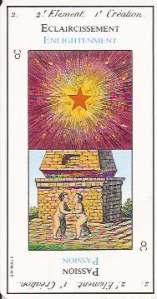Tarot History Rant #5: Etteilla the hairdresser

At least three times in the past few weeks I’ve heard people refer to “the hairdresser Etteilla,” mindlessly repeating disinformation that Eliphas Levi and A. E. Waite rather viciously spread about the founder of modern tarot. Etteilla-bashing hit its stride in the mid-19th century when Eliphas Levi published statements like:
Etteilla or Alliette, an illumine hairdresser, exclusively engrossed by his divinatory system, and the emolument he could derive from it, neither proficient in his own language nor even in orthography, pretended to reform, and thus attribute to himself the Book of Thoth.
This illuminated hairdresser, after working for thirty years, only succeeded in producing a bastard set, the Keys of which are transposed, so that the numbers no longer answer to the signs.
The writings of Etteilla, now very rare, are obscure, wearisome and barbarous in style.
Generations of authors have mindlessly parroted Levi without bothering to learn about the man behind the slander.
Why all the animosity?
Some of it was class snobbery. Etteilla had a clumsy writing style that showed his lack of formal education and his working class origins. High-minded occultists like Levi and Waite were appalled that Etteilla shamelessly used the sacred tarot for the vulgar activity of reading cards for housemaids. (Somewhat hypocritically, Waite managed to overcome his horror and revulsion long enough to include over 150 pages on divination in his book Pictorial Key to the Tarot.) Worse, Etteilla demonstrated monumental ignorance by scrambling the order of the trumps, then assigning alchemical and astrological attributions to the cards rather than the Kabbalistic Hebrew alphabet correspondences that still maintain a grip on esoteric tarot.
Why a hairdresser and not a ditch digger or dogcatcher?
Etteilla’s death certificate was witnessed by two people: a master hairdresser and Etteilla’s son, a grocer, whose address was listed as “the hairdresser’s house.” Somehow these hairdresser references got attached to Etteilla. Actually, his family engaged in various food-related trades. He started out as a seed merchant and later dealt in antique prints and imported tarot cards.
Why Etteilla deserves our respect
He was a one-man cartomantic phenomenon flourishing in Paris just before the Revolution. He wrote the first books we have on card reading and divination with tarot; he operated a school of tarot and astrology; and he wrote numerous books on card reading, palmistry, astrology and other occult subjects. He popularized the use of spreads and reversed cards, and his divinatory meanings for the minor arcana are the bedrock of the Waite Smith system. He was the first person to design a deck illustrating his occult philosophy accompanied by an explanatory book. His deck is still published by Grimaud/France Cartes.
Etteilla devoted his life to studying tarot as a sacred text and a tool for divination. When he died he left a small band of loyal students who carried on his teachings for decades. He deserves respect as the first modern, professional tarotist.
Want to read about other popular tarot history errors?
Rant #1 The Mists of Time
Rant#2 Renaissance Origins
Rant #3 The Church Condemns Tarot
Rant #4 The 22-Card Deck
References:
A Wicked Pack of Cards: The Origins of the Occult Tarot. Ronald Decker, Thierry dePaulis and Michael Dummett. St. Martins Press, New York, 1996.
Christine Payne-Towler, TarotArkLetters.com, 2007
Illustration: Card 2 from Grand Etteilla Egyptian Gypsies Tarot. Cartomancie Grimaud/France Cartes, 1977.


Reblogged this on Bonnie Cehovet and commented:
Excellent rant!
I love your rants! IThey provide people with places to do their own research, and see the difference betwee truth and fiction in the Tarot world.
I’m glad you enjoy them, Bonnie. One’s work is never done when crusading against historical ignorance.
I tend to bite my tongue and shake my head when people start spouting ignorant things about Tarot history. Not the highest road to take, but I don’t like getting into extended discussions about things like this. Honest sparring on the same subject, on the other hand, is quite interesting!
Most people spout historical errors because they haven’t read as much history as some of us. They just need a little gentle educating. Then there are the people who cling to their errors, like the folks who insist tarot was invented by Cathars, or invented to disseminate Kabbalistic teachings in code. I just leave those people to their beliefs and don’t engage them any more than I try to reason with the people who knock on my door clutching Bibles and pamphlets.
Rant on, Sherryl!
I surely will!
I completely agree!
After the many lashings Waite received from Aleister Crowley, not the least of which was an obituary while he yet lived, one would think Waite could have kept his contempt to himself. Wonder if his bashing of Etteilla influenced Crowletys’ own attacks on Waite. Class bashing doesn’t surprise me for the time period but still seems so unnecessary. Thanks fr a great article!
Thanks for your comment, Victoria. I think 19th and early 20th century occultists felt very conflicted about doing readings with a sacred book of eternal wisdom. Everyone was doing it, but no one really wanted to admit it. The fact that Etteilla did it in public, took money for it, and had no shame was probably a bit much for the likes of Levi and Waite.